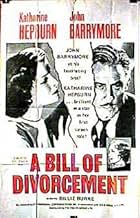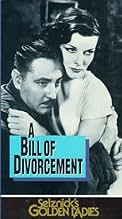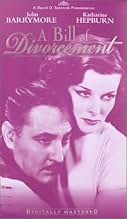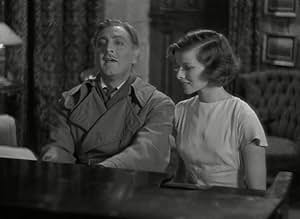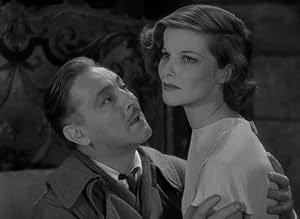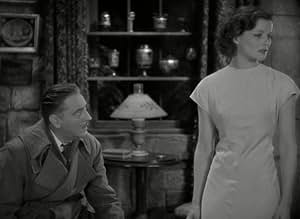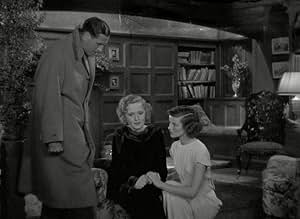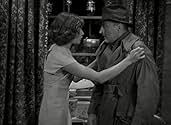A man, Hilary Fairfield returns home after fifteen years in a mental asylum. However, he finds things are not the way they were when he left.A man, Hilary Fairfield returns home after fifteen years in a mental asylum. However, he finds things are not the way they were when he left.A man, Hilary Fairfield returns home after fifteen years in a mental asylum. However, he finds things are not the way they were when he left.
- Director
- Writers
- Stars
- Awards
- 5 wins total
Bramwell Fletcher
- Gareth
- (uncredited)
Dick French
- Party Guest
- (uncredited)
Julie Haydon
- Party Guest
- (uncredited)
Dennis O'Keefe
- Party Guest
- (uncredited)
Mildred Shay
- Party Guest
- (uncredited)
- Director
- Writers
- All cast & crew
- Production, box office & more at IMDbPro
Featured reviews
At the start of A Bill of Divorcement, Billie Burke is hosting a glorious Christmas party for her family and friends. She's celebrating with her fiancé Paul Cavanagh, for they plan to take a vacation at New Year's and marry. Her sister-in-law Elizabeth Patterson disapproves because she still values Billie's first marriage to her brother, John Barrymore. After he came home from the war, John's shell shock devolved into insanity, and he's been in an asylum for fifteen years. When John escapes from the asylum, anxious to reclaim his place in the family, he's in for a rude awakening.
John Barrymore gives a wonderful, heartbreaking performance as the insane patriarch. His emotions are highly volatile and all worn on his sleeve, which fits his character and the situation perfectly. When he first comes home, he chances upon a young woman he believes to be his wife. It's actually Katharine Hepburn, his daughter all grown up, and the two have some very touching emotional scenes together. I don't know why this film was ignored at the Oscars, but it wasn't ignored at the Hot Toasty Rags. This is a very well-acted, well-written, thoughtful piece. Bring your Kleenexes when you sit down for this heavy drama. It might not be clear from the cheerful first scene, but you'll be in for quite a few tears by the end.
John Barrymore gives a wonderful, heartbreaking performance as the insane patriarch. His emotions are highly volatile and all worn on his sleeve, which fits his character and the situation perfectly. When he first comes home, he chances upon a young woman he believes to be his wife. It's actually Katharine Hepburn, his daughter all grown up, and the two have some very touching emotional scenes together. I don't know why this film was ignored at the Oscars, but it wasn't ignored at the Hot Toasty Rags. This is a very well-acted, well-written, thoughtful piece. Bring your Kleenexes when you sit down for this heavy drama. It might not be clear from the cheerful first scene, but you'll be in for quite a few tears by the end.
At 25, fourth-billed Katharine Hepburn bursts off the screen with her characteristic persona already fully formed in her screen debut as Sydney, the headstrong daughter of WWI veteran Hilary Fairfield, in this antiquated 1932 melodrama. Fifteen years earlier, Hilary was shell-shocked triggering a latent mental instability, which required his wife to institutionalize him. On the day his wife Meg files for divorce, he escapes the asylum in a docile state little realizing how much time has elapsed. In fact, he mistakes Sydney for Meg, as ironically, both Meg and Sydney are soon to be betrothed, The crux of the drama lies in Hilary's insanity and how his sudden appearance forces Meg and Sydney to make life-altering decisions. Directed by George Cukor, the film already shows his innate ease with larger-than-life actors like Hepburn and John Barrymore.
However, the screenplay by Howard Estabrook and Harry Wagstaff Gribble (adapted from an earlier British play by Clemence Dane) is severely dated in its attitude toward familial self-sacrifice, and the film is further hampered by a stilted feeling of staginess throughout. Already in career descent from his alcoholism, Barrymore gives a poignant performance as Hilary giving into heated theatrical fervor in just a couple of key scenes. In what was likely her most substantial role, Billie Burke (later Glinda the Good Witch in "The Wizard of Oz") makes Meg's dilemma palpable, while Elizabeth Patterson (later babysitter Mrs. Trumble on "I Love Lucy") is surprisingly dour as self-righteous Aunt Hester. Hepburn's destiny seems assured from the very first scene, and this was to be the start of her remarkable 47-year professional relationship with Cukor. As of March 2008, the film is not available on DVD.
However, the screenplay by Howard Estabrook and Harry Wagstaff Gribble (adapted from an earlier British play by Clemence Dane) is severely dated in its attitude toward familial self-sacrifice, and the film is further hampered by a stilted feeling of staginess throughout. Already in career descent from his alcoholism, Barrymore gives a poignant performance as Hilary giving into heated theatrical fervor in just a couple of key scenes. In what was likely her most substantial role, Billie Burke (later Glinda the Good Witch in "The Wizard of Oz") makes Meg's dilemma palpable, while Elizabeth Patterson (later babysitter Mrs. Trumble on "I Love Lucy") is surprisingly dour as self-righteous Aunt Hester. Hepburn's destiny seems assured from the very first scene, and this was to be the start of her remarkable 47-year professional relationship with Cukor. As of March 2008, the film is not available on DVD.
VERY stagy but interesting film served as Hepburn's screen bow. She's a trifle studied and Barrymore occasionally goes over the top but mixed in with that is some excellent acting by both. Billie Burke, more subdued than usual, delivers the film's best most consistent performance. She does a very fine job of showing the anguish of a life suddenly turned upside down. The three of them are really the whole show.
Considering the cast and the historical place in Kate's filmography as her debut the film is frustratingly difficult to see. Odd considering the relative availability of the rest of her canon, exempting the obscure Grace Quigley.
Some of the attitudes are dated but because of the star trio this is worth tracking down.
Considering the cast and the historical place in Kate's filmography as her debut the film is frustratingly difficult to see. Odd considering the relative availability of the rest of her canon, exempting the obscure Grace Quigley.
Some of the attitudes are dated but because of the star trio this is worth tracking down.
Katharine's Hepburn's screen debut proved to be a stronger film than I expected, starring alongside the great John Barrymore in this tragic mental illness melodrama and when I say tragic, I do mean tragic. Boy does this movie lay it on thick but it sure made this viewer's hear sink. Even before Barrymore appears on screen I was already starting to feel sorry for this character upon learning he's spent years at a mental asylum with shell shock and couldn't pursue his music, and that's only the beginning. You know that dirty word people like to throw around, "manipulative"; well this movie certainly manipulated me. Yet despite the story laying additional tragic layers after another, the performances make it work and prevent it from coming come off as totally ridiculous.
Watching Katharine Hepburn I would never have guessed this was her first film, she is entirely natural and gives the impression of someone has much acting experience. Plus she was never more youthful than she is here, springing full of energy and life. Supposedly director George Cuckor inserted shots in the film which did nothing to advance the story nor deepen character but were simply lingering shots of Hepburn in which the audience could adjust and get acquainted with her.
John Barrymore, however, is the main star of the show. Throughout the film there is a sadness and fragile nature of his voice while he denies the reality of the situation to himself and pulling the puppy dog eyes; with the occasional scenery chewing outburst. He's a ham but a lovable ham. I feel the most powerful moment in the film is the scene in which Barrymore breaks into tears into the arms of his neglectful wife (Billie Burke) while she can't even bear to look at him; I almost broke into a tear myself.
I've read many comments describing the film "stagey" - not at all. Shots are framed with depth, often at different angles and with objects framed in the foreground; George Cukor was a better director than that. A Bill of Divorcement is a heart sinker if there ever was one.
Watching Katharine Hepburn I would never have guessed this was her first film, she is entirely natural and gives the impression of someone has much acting experience. Plus she was never more youthful than she is here, springing full of energy and life. Supposedly director George Cuckor inserted shots in the film which did nothing to advance the story nor deepen character but were simply lingering shots of Hepburn in which the audience could adjust and get acquainted with her.
John Barrymore, however, is the main star of the show. Throughout the film there is a sadness and fragile nature of his voice while he denies the reality of the situation to himself and pulling the puppy dog eyes; with the occasional scenery chewing outburst. He's a ham but a lovable ham. I feel the most powerful moment in the film is the scene in which Barrymore breaks into tears into the arms of his neglectful wife (Billie Burke) while she can't even bear to look at him; I almost broke into a tear myself.
I've read many comments describing the film "stagey" - not at all. Shots are framed with depth, often at different angles and with objects framed in the foreground; George Cukor was a better director than that. A Bill of Divorcement is a heart sinker if there ever was one.
Unlike some other reviewers here, I did not find the acting stagy or over-the-top melodramatic. Then again, most of the movies I watch are from the 20s and 30s, so I am used to this style of acting.
I was surprised by this movie. It breaks your heart, then never lets up. There's no light comedy to offset the drama, and there's no happy ending.
John Barrymore was amazing. My favorite performances of his have for a long time been Dr Jekyll (1920) and Svengali (1931). I've seen many other films of his (including Counsellor at Law which many people claim to be one of his best performances), but after seeing Bill of Divorcement tonight, I think this might be my most favorite performance. Sure, it was hammy, but that doesn't make it bad. Barrymore emoted his heart out, and my heart did literally ache each time he expressed his own agony and pain on screen. I was shocked to find myself in tears over his character's pain.
Billie Burke was a wonderment as well. I know her best from her slightly comic roles, such as the supercilious wife in Dinner at Eight, or her various Mrs. Topper roles (and, yes, of course Glinda the Good Witch). I didn't know she had it in her to do dramatic stuff, but she had me in tears as well on more than one occasion. She really made me feel the agony and conflict she was in, being in love with Paul Cavanagh and yet feeling pity and obligation to Barrymore.
I found the writing and the direction to be superb. One particular scene was almost sublime in its pathos: Billie Burke sitting in a chair, John Barrymore on the floor with his arms wrapped around her, his head in her lap as he cries. He can't comprehend why she doesn't want him, he asks her didn't she vow to be with him through better and worse, through sickness and in health? He asked what he did that was wrong, other than to get sick? He reminds her of what a kind person she is, how he even noticed her once stepping around a "green crawling thing" so as to not harm the creature, and he wonders if she could show pity and compassion to the green crawling thing, then why couldn't she show the same kind of compassion to him? Three-hankie stuff for sure!
I was surprised by this movie. It breaks your heart, then never lets up. There's no light comedy to offset the drama, and there's no happy ending.
John Barrymore was amazing. My favorite performances of his have for a long time been Dr Jekyll (1920) and Svengali (1931). I've seen many other films of his (including Counsellor at Law which many people claim to be one of his best performances), but after seeing Bill of Divorcement tonight, I think this might be my most favorite performance. Sure, it was hammy, but that doesn't make it bad. Barrymore emoted his heart out, and my heart did literally ache each time he expressed his own agony and pain on screen. I was shocked to find myself in tears over his character's pain.
Billie Burke was a wonderment as well. I know her best from her slightly comic roles, such as the supercilious wife in Dinner at Eight, or her various Mrs. Topper roles (and, yes, of course Glinda the Good Witch). I didn't know she had it in her to do dramatic stuff, but she had me in tears as well on more than one occasion. She really made me feel the agony and conflict she was in, being in love with Paul Cavanagh and yet feeling pity and obligation to Barrymore.
I found the writing and the direction to be superb. One particular scene was almost sublime in its pathos: Billie Burke sitting in a chair, John Barrymore on the floor with his arms wrapped around her, his head in her lap as he cries. He can't comprehend why she doesn't want him, he asks her didn't she vow to be with him through better and worse, through sickness and in health? He asked what he did that was wrong, other than to get sick? He reminds her of what a kind person she is, how he even noticed her once stepping around a "green crawling thing" so as to not harm the creature, and he wonders if she could show pity and compassion to the green crawling thing, then why couldn't she show the same kind of compassion to him? Three-hankie stuff for sure!
Did you know
- TriviaDavid O. Selznick and George Cukor disagreed about casting Katharine Hepburn. Cukor had seen Hepburn's screen test and was impressed by the 24-year-old, but Selznick did not like the way she looked and was afraid she would not be well received by audiences. Cukor cast her anyway (beginning what would be a lifelong professional and personal relationship between the two)
- Goofs'Katharine Hepburn' is misspelled in the credits as 'Katherine Hepburn'.
- Quotes
Hilary Fairfield: Do you know what the dead do in Heaven? They sit on their golden chairs and sicken for home.
- Crazy creditsSydney Fairfield is the name of Katharine Hepburn's character in the film, but her name is spelled Sidney in the credits.
- ConnectionsFeatured in David O. Selznick: 'Your New Producer' (1935)
- SoundtracksSilent Night, Holy Night (1818)
(uncredited)
Music by Franz Xaver Gruber
Lyrics by Joseph Mohr
English lyrics anonymous
Sung by carollers on Christmas Eve
- How long is A Bill of Divorcement?Powered by Alexa
Details
Box office
- Budget
- $300,000 (estimated)
- Runtime1 hour 10 minutes
- Color
- Aspect ratio
- 1.37 : 1
Contribute to this page
Suggest an edit or add missing content


